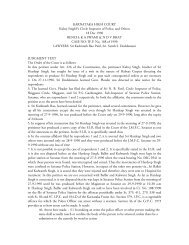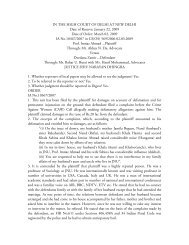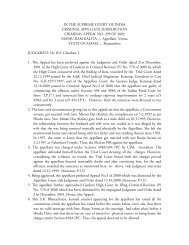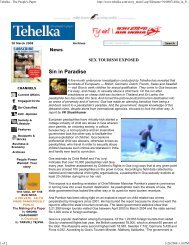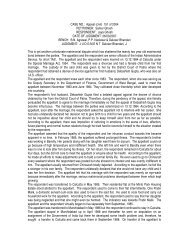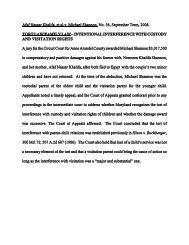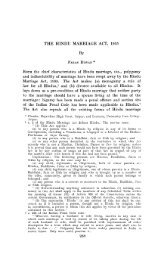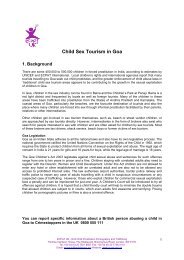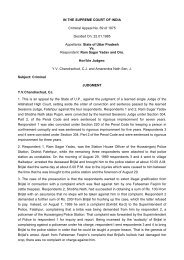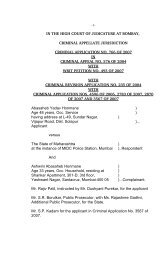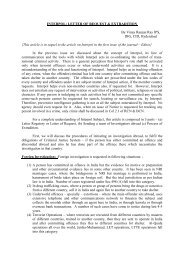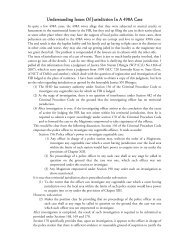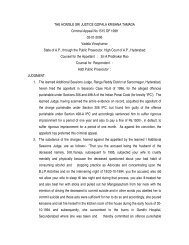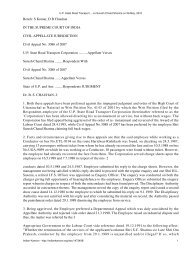Raj Deo Sharma v. State of Bihar - IPC 498A
Raj Deo Sharma v. State of Bihar - IPC 498A
Raj Deo Sharma v. State of Bihar - IPC 498A
Create successful ePaper yourself
Turn your PDF publications into a flip-book with our unique Google optimized e-Paper software.
PETITIONER:RAJ DEO SHARMAVs.RESPONDENT:THE STATE OF BIHARDATE OF JUDGMENT: 08/10/1998BENCH:CJI, K.T.ACT:HEADNOTE:JUDGMENT:J U D G M E N TLeave granted.On November 2, 1982, a case was registered againstthe petitioner regarding an <strong>of</strong>fence under Section 5(2) readwith Section 5(1) (e) <strong>of</strong> the prevention <strong>of</strong> Corruption Act(Act 11 <strong>of</strong> 1947). A charge sheet was submitted on 30.8.1985by the C.B.I. in which the alleged disproportionate assets<strong>of</strong> the petitioner as on 5.11.1982 amounted to Rs.9.10.932.41 along with a list <strong>of</strong> 40 witnesses and 20documents. The Special Judge, C.B.I., South <strong>Bihar</strong>, Patnatook cognisance <strong>of</strong> the <strong>of</strong>fences on 14.11.1986 and issuedsummons fixing 2.12.1986 as the date for appearance. On24.4.1987, the petitioner appeared before court, applied forand obtained bail. The charges were framed by the SpecialJudge on 4.3.1993. Three withnesses were examined by theprosecution till 1.6.1995.2.The petitioner filed a writ petition in the highCourt <strong>of</strong> Patna on 5.12.1995 praying inter alia for quashingthe entire prosecution including the F.I.R. on the groundthat more than 13 years had elapsed since the institution <strong>of</strong>the F.I.R. and thus the right <strong>of</strong> the petitioner to speedytrial was violated.The petition registered as Cr. W.J.C.No. 809/95 was dismissed by the High Court on 7.12.1995 onthe ground that the delay was due to the fact that there wasonly one Special Court <strong>of</strong> the C.B.I. functioning and alarge number <strong>of</strong> cases were pending before it. It is thesaid order which is challenged in this petition.2.The petitioner filed a writ petition in the HighCourt <strong>of</strong> Patna on 5.12.1995 praying inter alia for quashingthe entire prosecution including the F.I.R on the groundthat more than 13 years had elapsed since the institution <strong>of</strong>the F.I.R and thus the right <strong>of</strong> the petitioner to speedytrial was violated. The petition registered as Cr. W.J.C.No. 809/95 was dismissed by the High Court on 7.12.1995 onthe ground that the delay was due to the ract that there wasonly one Special Court <strong>of</strong> the C.B.I. functioning and alarge number <strong>of</strong> cases were pending before it.said order which is challenged in this petition.It is the3.After service <strong>of</strong> notice and appearance <strong>of</strong> therespondent, the Superintendent <strong>of</strong> Police, C.B.I., Patna wasarrayed as second respondent. By order dated 9.12.1996. areport was called for from the Special Judge as to the1
condition <strong>of</strong> the present case as well as other casessimilarly blocked up. The report <strong>of</strong> the Special Judge dated25.12.1996 has disclosed a shocking state <strong>of</strong> affairs. Asregards the present case, the relevant part <strong>of</strong> the reportreads as follows:-"According to chargesheet there are as many asforty witnesses out <strong>of</strong> whom, the prosecution hasexamined till today only three witnesses. Thelast witness was examined on 3.9.93. Thereafter36 adjournments were given to the prosecution forexamination <strong>of</strong> remaining witnesses. However, theProsecution has failed to examine any <strong>of</strong> theremaining witnesses. The next date fixed in thecase for production <strong>of</strong> witness by the prosecutionis 6.1.97. it would not be out <strong>of</strong> place thatmyself joined as Special Judge only on 21.9.96.thereafter I also directed the C.B.I. to producewitnesses."4.The report contains details <strong>of</strong> other pending cases.There are as many as 52 cases ranging from 1975 to 1996pending at the stage <strong>of</strong> evidence relating to C.B.I., South<strong>Bihar</strong> and 44 cases ranging from 1972 to 1992 relating toC.B.I. , North <strong>Bihar</strong>. By order dated 6.1.1997. Wedirected the Superintendent <strong>of</strong> Police to file a counteraffidavit explanatory to the remarks made by the SpecialJudge in his report with regard to the pendency <strong>of</strong> matters.The counter affidavit filed by the Superintendent <strong>of</strong> Policein February, 1997 has attempted to throw the blame on theaccused. In para 9 there<strong>of</strong>, it is stated as follows:-"However, on perusal <strong>of</strong> the order sheetit would appear that all the times despite thepolice papers being made available and inspectionbeing completed, the accused with a view to delayframing <strong>of</strong> the charge, filed petition afterpetition for supply <strong>of</strong> police papers. Suchpetitions on behalf <strong>of</strong> the accused were nothingbut a dilatory device to delay framing <strong>of</strong> thecharge. Ultimately, charge was framed on 4.3.93;it is also true that only 3 PWs have beenexamined till date, for the only reason thatthere has been only one court <strong>of</strong> Special Judge atPatna hearing Special Cases <strong>of</strong> C.B.I. since19.4.94 till date. It is also submitted that ona number <strong>of</strong> occasions the accused remainedabsent. No bailable warrant or nonbailablewarrants could be obtained against the witnesses,as the trial court always remained busy in othercases. It is pertinent to mention that theSpecial Judge for C.B.I., is also Special judgefor Vigilances Cases. The Special Court forC.B.I. also hears Sessions Trials and CivilAppeals and as such the Court is hardly left withtime to hear exclusively the cases <strong>of</strong> AntiCorruption matters. Over and above, C.B.I. had256 cases pending before the special judge inJune. 1995, besides cases <strong>of</strong> VigilanceDepartment, Government <strong>of</strong> <strong>Bihar</strong> and other regularcases such as Cr. Appeals, Session trialsentrusted to him by the District and SessionJudge, Patna."5.A rejoinder has been filed by the petitionerrefuting the allegations in the counter-affidavit andreiterating that the delay in this case is entirely due tothe fault <strong>of</strong> the prosecution which has prejudiced hisfundamental right to speedy trial. It is stated therein thatthe prosecution failed to produce the documents on 48occasions and failed to produce witnesses on 46 occasions.2
6.The question before us is whether on the facts andcircumstances <strong>of</strong> the case, the prosecution against thepetitioner is to be quashed on the ground <strong>of</strong> delay in theconduct <strong>of</strong> trial. The petitioner has neverincarceration. As stated earlier, his applicationsufferedfor bailwas ordered on thepresented the same.day he appeared before the Court and7.The entitlement <strong>of</strong> the accused to speedy trial hasbeen repeatedly emphasised by this Court. Through it is notenumerated as a fundamental right in the Constitution, thisCourt has recognized the same to be implicit in the spectrum<strong>of</strong> Article 21. In Hussainara Khatoon Versus Home Secretary,<strong>State</strong> <strong>of</strong> <strong>Bihar</strong> (1980) 1 S.C.C. 81, the Court while dealingwith the cases <strong>of</strong> undertrials who had suffered longincarceration held that a procedure which keeps such largenumber <strong>of</strong> people behind bars without trial so long cannotpossibly be regarded as reasonable, just or fair so as to bein conformity with the requirement <strong>of</strong> Article 21. The Courtlaid stress upon the need for enactment <strong>of</strong> a law to ensurereasonable, just and fair procedure which has creativeconnotation after Manoka Gandhi's case [(1978) 1 S.C.C.248)]in the matter <strong>of</strong> criminal trials.8.In Hussainara Khatoon and others (IV) versus HomeSecretary. <strong>State</strong> <strong>of</strong> <strong>Bihar</strong>, Patna (1980) 1 S.C.C 98 thisCourt held that financial constraints and priorities inexpenditure would not enable the Government to avoid itsduty to ensure speedy trial to the accused.9.In <strong>State</strong> <strong>of</strong> Maharashtra versus Champalal PunjajiShan (1981) 3 S.C.C. 610 the Court took cognizance <strong>of</strong> thefact that the prosecution would in some cases deliberatelyadopt delaying tactics to keep the accused persons in jailas long as possible and to harass them particularly when theevidence is <strong>of</strong> a weak character and the conviction is not aprobable result. The Court also pointed out that theaccused person may be seriously jeopardised in the conduct<strong>of</strong> his defence with the passage <strong>of</strong> time as witnesses for thedefence may become unavailable and their memories may fail.However, the Court pointed out that a delayed trial is notnecessarily an unfair trial and the delay may be occasionedby the tactics or the conduct <strong>of</strong> the accused himself.10.In Madhu Mehta versus Union <strong>of</strong> India (1989) 4 S.C.C.62 this Court commuted the death sentence to lifeimprisonment whiletaken into accountholding that inordinate delay should befor purpose <strong>of</strong> deciding whether theexecution <strong>of</strong> the sentence should be carried out or should bealtered into imprisonment for life. The Court also observedthat no fixed period <strong>of</strong> delay would be considered to bedecisive.11.In Abdul Rehman Antulay andNayak and another (1992) 1 S.C.C.others225versus R.S.the ConstitutionBench <strong>of</strong> this Court dealt with this aspect <strong>of</strong> the matter andlaid down certain guidelines.the judgment are as follows:-The relevant passages inAnother question seriously canvassedbefore us related to the consequence flowing froman infringement <strong>of</strong> right to speedy trial.Counsel for accused argued on the basis <strong>of</strong> theobservations in Sheela Barse and Strunk that theonly consequence is quashing <strong>of</strong>conviction, as the case may be.charges and/orNormally, it maybe so. But we do not think that is the onlyorder open to court. In a given case, the factsincluding the nature <strong>of</strong> <strong>of</strong>fence - may be suchthat quashing <strong>of</strong> charges may not be in theinterest <strong>of</strong> justice. After all, every <strong>of</strong>fencemore so economic <strong>of</strong>fences, those relating topublic <strong>of</strong>ficials and food adulteration - is an3
<strong>of</strong>fence against society. It is really thesociety - the <strong>State</strong> - that prosecutes the<strong>of</strong>fender. We may in this connection recall theobservations <strong>of</strong> this court in Champalal PunjajiShah. In cases, where quashing <strong>of</strong>charges/convictions may not be in the interest <strong>of</strong>justice, it shall be open to the court to passsuch appropriate orders as may be deemed just inthe circumstances <strong>of</strong> the case. Such orders may,for example, take the shape <strong>of</strong> order forexpedition <strong>of</strong> trial and its conclusion within aparticular prescribed period, reduction <strong>of</strong>sentence when the matter comes up afterconclusion <strong>of</strong> trial and conviction, and so on.In view <strong>of</strong> the above discussion, thefollowing propositions emerge, meant to serve asguidelines. We must forewarn that thesepropositions are not exhaustive. It is difficultto foresee all situations. Nor is it possible tolay down any hard and fast rules. Thesepropositions are :-1) Fair, just and reasonable procedureimplicit in Article 21 <strong>of</strong> the Constitutioncreates a right in the accused to be triedspeedily. Right to speedy trial is the right <strong>of</strong>the accused. The fact that a speedy trial is alsoin public interest or that it serves the socialinterest also does not make it any the less theright <strong>of</strong> the accused. It is in the interest <strong>of</strong>all concerned that the quilt or innocence <strong>of</strong> theaccused is determined as quickly as possible inthe circumstances.2) Right to speedy trial flowing fromArticle 21 encompasses all the stages, namely thestage <strong>of</strong> investigation, inquiry, trial, appeal,revision and re-trial. That is how, this Courthas understood this right and there is no reasonto take a restricted view.3) The concerns underlying the right tospeedy trial from the point <strong>of</strong> view <strong>of</strong> theaccused are :-(a) the period <strong>of</strong> remand andpre-conviction detention should beas short as possible. In otherwords, the accused should not besubjected to unnecessary or undulylong incarceration prior to hisconviction;(b) the worry, anxiety, expense anddisturbance to his vocation andpeace, resulting from an undulyprolonged investigation, inquiry ortrial should be minimal; and(c) undue delay may well result inimpairment <strong>of</strong> the ability <strong>of</strong> theaccused to defend himself, whetheron account <strong>of</strong> death, disappearanceor non-availability <strong>of</strong> witnesses orotherwise.4) At the same time, one cannot ignorethe fact that it is usualy the accused who isinterested in delaying the proceedings. As is<strong>of</strong>ten pointed out, "delay is a known defencetactic". Since the burden <strong>of</strong> proving the quilt<strong>of</strong> the accused lies upon the prosecution, delayordinarily prejudices the prosecution.4
Non-availability <strong>of</strong> witnesses, disappearance <strong>of</strong>evidence by lapse <strong>of</strong> time really work against theinterest <strong>of</strong> the prosecution. Of course, theremay be cases where the prosecution, for whateverreason, also delays the proceedings. Therefore,in every case, where the right to speedy trial isalleged to have been infringed, the firstquestion to be put andresponsible for the delay?answered is - who isProceedings taken byeither party in good Maith to vindicate theirrights and interest, as perceived by them, cannotbe treated as delaying tactics nor can the timetaken in pursuing such proceedings be countedtowards delay. It goes without saying thatfrivolous proceedings or proceedings taken merelyfor delaying the day <strong>of</strong> rockoning cannot betreated as proceedings taken in good faith. Themore fact that an application/petition isadmitted and an order <strong>of</strong> stay granted by asuperior court is by itself no pro<strong>of</strong> that theproceeding is not frivolous. Very <strong>of</strong>ten thesestays are obtained on ex-parte representation.5) While determining whether undue delayhas occurred (resulting in violation <strong>of</strong> Right toSpeedy Trial) one must have regard to all theattendant circumstances, including nature <strong>of</strong><strong>of</strong>fence, number <strong>of</strong> accused and witnesses, theworkload <strong>of</strong> the court concerned, prevailing localconditions and so on - what is called, thesystemic delays. It is true that it is theobligation <strong>of</strong> the <strong>State</strong> to ensure a speedy trialand <strong>State</strong> includes judiciary as well, but arealistic and practical approach should beadopted in such matters instead <strong>of</strong> a pedanticone.6) Each and every delay does notnecessarily prejudice the accused. Some delaysmay indeed work to his advantage. As has beenobserved by Powell, J. in Barker "it cannot besaid how long a delay is too long in a systemwhere justice is supposed to be swift butdeliberate". The same idea has been stated bywhitel, J.words:in U.S. V. Ewell in the following... the Sixth Amendment right to a speedytrial is necessarily relative, is consistent withdelays, and has orderly expedition, rather thanmore speed, as its essential ingredients; andwhether delay in completing a prosecution amountsto an unconstitutional deprivation <strong>of</strong> rightsdepends upon all the circumstances'.However, inordinately long delay may betaken as presumptive pro<strong>of</strong> <strong>of</strong> prejudice. In thiscontext, the fact <strong>of</strong> incarceration <strong>of</strong> accusedwill also be ashould not berelevant fact. The prosecutionallowed to become a persecution.But when does the prosecution become persecution,again depends upon the facts <strong>of</strong> a given case.7) We cannot recognize or give effect to,what is called the 'demand' rule. An accusedcannot try himself; he is tried by the court atthe behest <strong>of</strong> the prosecution.accused's plea <strong>of</strong> denial <strong>of</strong> speedyHence, antrial cannotbe defeated by saying that the afccused did at notime demand a speedy trial. If in a given case,he did make such a demand and yet he was nottried speedily, it would be a plus point in his5
favour, but the mere non-asking for a speedytrial cannot be put against the accused. Even inUSA, the relevance <strong>of</strong> demand rule has beensubstantially watered down insucceeding cases.Barker and other8)andUltimately, the court has to balanceweigh the several relevant factors -balancingdeterminetest orin each'balancing process' - andcase whether the right tospeedy trial has been denied in a given cases.9) Ordinarily speaking, where the courtcomes to the conclusion that right to speedytrial <strong>of</strong> an accused has been infringed thecharges or the conviction, as the case may be,shall be quashed. But this is not the onlycourse open. The nature <strong>of</strong> the <strong>of</strong>fence and othercircumstances in a given case may be such thatquashing <strong>of</strong> proceedings may not be in theinterest <strong>of</strong> justice. In such a case, it is opento the court to make such other appropriate order- including an order to conclude the trial withina fixed time where the trial is not concluded orreducing the sentence where the trial hasconcluded - as may be deemed just and equitablein the circumstances <strong>of</strong> the case.10) It is neither advisable norpracticable to fix any timelimit for trial <strong>of</strong><strong>of</strong>fences. Any such rule is bound to be qualifiedone. Such rule cannot also be evolved merely toshift the burden <strong>of</strong> proving justification on tothe shoulders <strong>of</strong> the prosecution. In every case<strong>of</strong> complaint <strong>of</strong> denial <strong>of</strong> right to speedy trial,it is primarily for the prosecution to justifyand explain the delay. At the same time, it isthe duty <strong>of</strong> the court to weigh all thecircumstances <strong>of</strong> a given case before pronouncingupon the complaint. The Supreme Court <strong>of</strong> USA toohas repeatedly refused to fix any such outertimelimit in spite <strong>of</strong> the Sixth Amendment. Nordo we think that not fixing any such outer limitineffectuates the guarantee <strong>of</strong> right to speedytrial.11)rightAn objectionto speedybasedtrialonanddenial <strong>of</strong>for relief on thataccount, should first be addressed to the HighCourt. Even if the High Court entertains such aplea, ordinarily it should not stay theproceedings, except in a case <strong>of</strong> grave andexceptional nature. Such proceedings in HighCourt must, however, be disposed <strong>of</strong> on a prioritybasis.12.InS.C.C.Kartar Singh versus <strong>State</strong> <strong>of</strong> Punjab (1994) 3569 another Constitution Bench to which one <strong>of</strong> us(M.M.Punchhi, j. as he then was) party observed thus:"The concept <strong>of</strong> speedy trial is read intoArticle 21 as an essential part <strong>of</strong> fundamentalright to life and liberty guaranteed andpreserved under out Constitution. The right tospeedy trial beginsimposed by arrest andwith the actual restraintconsequent incarcerationand continues at all stages, namely, the stage <strong>of</strong>investigation, enquiry, trial, appealrevision so that any possible prejudice thatandmayresult from impermissible and avoidable delayfrom the time <strong>of</strong> the commissiontill it consummates into a<strong>of</strong> thefinality,<strong>of</strong>fencecan beaverted. In this context, it may be noted that6
the constitutional guarantee <strong>of</strong> speedy trial isproperly reflected in Section 309 <strong>of</strong> the Code <strong>of</strong>criminal Procedure .................Of course, no length <strong>of</strong> time is per setoo long to pass scrutiny under this principlenor the accused is called upon the show theactual prejudice by delay <strong>of</strong> disposal <strong>of</strong> cases.On the other hand, the Court has to adopt abalancing approach by taking note <strong>of</strong> the possibleprejudices and disadvantages to be suffered bythe accused by avoidable delay and to determinewhether the accused in a criminal proceeding hasbeen deprived <strong>of</strong> his right <strong>of</strong> having speedy trialwith unreasonable delay which could be identifiedby the factors - (1) length <strong>of</strong> delay, (2) thejustification for the delay, (3) the accused'sassertion <strong>of</strong> his right to speedy trial, and (4)prejudice caused to the accused by such delay.However, the fact <strong>of</strong> delay is dependent on thecircumstances <strong>of</strong> each case because reasons fordelay will very, such as delay in investigationon account <strong>of</strong> the widespread ramification <strong>of</strong>crimes and its designed network either nationallyor internationally, the deliberate absence <strong>of</strong>witness or witnesses, crowded dockets on the file<strong>of</strong> the court etc."13.The above observations have to be understood in thebackdrop <strong>of</strong> the issues involved in that case. Theconstitutional validity <strong>of</strong> Terrorist and DeisruptiveActivities (Prevention ) Act, 1987 (TADA) was questioned anda five judge bench was then considering various contentionsincluding the possibility <strong>of</strong> persons accused <strong>of</strong> <strong>of</strong>fencesunder TADA remaining in jail as under trial prisoners forlong period on account <strong>of</strong> harsher and more stringentprovisions relating to grant <strong>of</strong> bail. The observations madetherein cannot, therefore, be read as in any way differentfrom the observations made by the seven judge bench in ARAntulay (1992) (1) SCC 225). Hence, the legal positionadumbrated by this court in AR Antulay that the right tospeedy trial flows from Article 21 and it encompasses thestages right from the date <strong>of</strong> registration <strong>of</strong> the FIR andonwards remains unaltered.14.But it has become necessary to consider the matterat some length and lay down the additional guidelines inview <strong>of</strong> the large pendency <strong>of</strong> the cases before the SpecialCourt, Patna for more than two decades by now. There may besimilar pendency in other <strong>State</strong>s also.15.The Code <strong>of</strong> Criminal Procedure is comprehensiveenough to enable the Magistrate to close the prosecution ifthe prosecution is unable to produce its witnesses inspite<strong>of</strong> repeated opportunities. Section 309(1) Cr. P.C. supportsthe above view as it enjoins expeditious holding <strong>of</strong> theproceedings and continuous examination <strong>of</strong> witnesses from daytoday. The section also provides for recording reasons foradjourning the case beyond the following day.16.After deep consideration <strong>of</strong> the matter, we proceedto supplement the propositions laid down by the Constitutionbench in Antulay's case (supra) with the followingdirections:-(i) In cases where the trial is for an <strong>of</strong>fencepunishable with imprisonment for a period not exceedingseven years, whether the accused is in jail or not, thecourt shall close the prosecution evidence on completion <strong>of</strong>a period <strong>of</strong> two years from the date <strong>of</strong> recording the plea <strong>of</strong>the accused on the charges framed whether the prosecutionhas examined all the witnesses or not, within the saidperiod and the court can proceed to the next step provided7
y law for the trial <strong>of</strong> the case.(ii) In such cases as mentioned above, if theaccused has been in jail for a period <strong>of</strong> not less than onehalf <strong>of</strong> the maximum period <strong>of</strong> punishment prescribed for the<strong>of</strong>fence, the trial court shall release the accused on bailforthwith on such conditions as it deems fit.(iii) If the <strong>of</strong>fence under trial is punishable withimprisonmentaccused isfor a period exceeding 7 years, whether thein jail or not, the court shall close theprosecution evidence on completion <strong>of</strong> three years from thedate <strong>of</strong> recording the plea <strong>of</strong> the accused on the chargeframed, whether the prosection has examined all thewitnesses or not within the said period and the court canproceed to the next step provided by law for the trial <strong>of</strong>the case, unless for very exceptional reasons to be recordedand in the interest <strong>of</strong> justice the court considers itnecessary to grant further time to the prosecution to adduceevidence beyond the aforesaid time limit.(iv) But if the inability for completing theprosecution within the aforesaid period is attributable tothe conduct <strong>of</strong> the accused in protracting the trial, nocourt is obliged to close the prosecution evidence withinthe aforesaid period in any <strong>of</strong> the cases covered by clauses(i) to (iii).(v) Where the trial has been stayed by orders <strong>of</strong>court or by operation <strong>of</strong> law such time during which the staywas in force shall be excluded from the aforesaid period forclosing prosecution evidence. The above directions will bein addition to and without prejudice to the directionsissued by this Court in "Common Cause" Vs. Union <strong>of</strong> India(1996)(4) SCC 33) as modified by the same bench through theorder reported in "Common Cause" a registered Society Vs.Union <strong>of</strong> India (1996) (6) SCC 775).17.In the result, we set aside the impugned orderpassed by the High Court and direct the Special Judge,C.B.I. South <strong>Bihar</strong>, Patna to pass appropriate orders in thecase <strong>of</strong> the petitioner in pursuance <strong>of</strong> this judgment. Theappeal is allowed accordingly.18.We issue the following additional direction in s<strong>of</strong>ar as the <strong>State</strong> <strong>of</strong> <strong>Bihar</strong> is concerned:-The <strong>State</strong> <strong>of</strong> <strong>Bihar</strong> shall constitute, within a period<strong>of</strong> three months from today, at least five Special Courts, totry the cases involving <strong>of</strong>fences under the Prevention <strong>of</strong>Corruption Act 1988 or its corresponding previous Act withor without other <strong>of</strong>fences allied to them............CJI.............J( K.T. Thoms ).............JNew DelhiOctober 8, 1998.8



